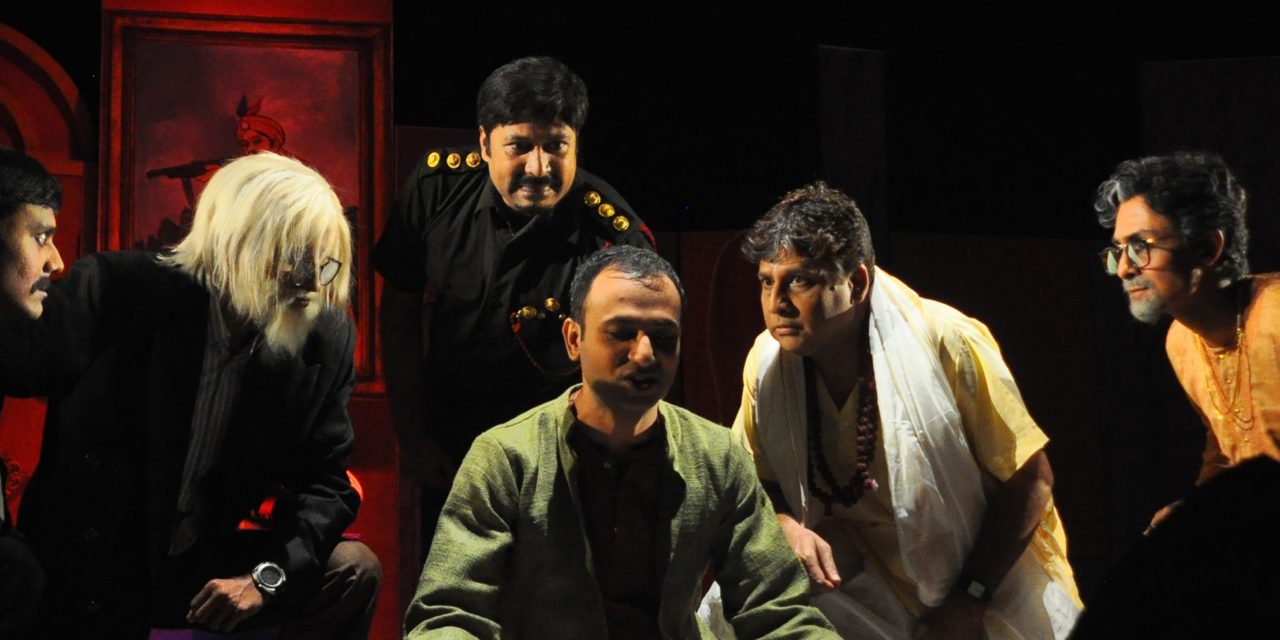Nandimukh is a popular theatre-group which has kept the audience of Bengal mesmerized since the mid-sixties, when Ajitesh Bandyopdhyay, the noted thespian and actor, had parted ways with Nandikaar and created it. Since then, sometimes at a fast pace, sometimes in a sluggish one, this group is making its presence felt in the theatrical arena. After Ajitesh’s demise, Ashoke Chattopadhyay, his noted disciple has come to the helm to keep it going strong, with perfect elan.
On August 8th, this group took another opportunity to keep the audience spell-bound with its unmatched production, Singhasaner Kshayrog (Decadence of the Throne.) Mohit Chattopadhyay wrote this play in 1967 and that very year it had been staged by Anukaar group, under the direction of Dipendra Sengupta, and it won plaudits too. But, for long, this play had gone behind all eyes just like a flower, going obsolete, dares re-surface. Staging of the play this time had enough reason to keep the audience glued to the performance. The play is about an imagined kingdom, where the Queen ruled her subjects as the King. Her husband had been brutally butchered by the people of the land as his views and principles were detrimental to the progress of the country. The Queen, beautiful and intelligent, wily and witty, peremptory in issuing diktats though fragile within, is the ruler who sits on the throne and whose word stands final. But, she has to depend on a “ruler of the castle” (durgoshashak) who implements her orders, a Scientist who invents machinery to terrorize the state, and a newsman, who is the spokesperson of the Queen, with a servile pen. A drummer, Jibanlal, disseminates all decisions among the subjects by beating his drums aloud. The Queen loves her maid, Chitralekha, blindly, and trusts her so much that she opens herself up to her, quite unconditionally.
The Queen announces that she is going to auction the garden, where flowers bloom, the birds chirp, and the subjects have an affinity to it. Naturally, on getting the news of auction, though she promises to spend the money on the welfare of the subjects, infuriates the latter. They go up in arms to the palace, raising commotion of disgust, burning effigies of the cruel “ruler of the castle” and even the Queen! Queen enjoys the uproar, even conflagration of effigies and sits unperturbed on the throne, issuing orders to her subordinates. But matters grow worse, when Jibanlal and Chitralekha, the Queen’s maid join hands with the violent mob, when an artist makes his presence felt in the palace and implores the Queen not to auction the garden, as the blossoms there, stirred his heart to creation, gave language to his mute desires of creation on canvas! The artist expresses his anger on the Castle-Administrator, as he stops him to see the Queen. The Queen tries to put her wiles to use and hypnotize the artist by sheltering him in the castle, asking him to draw according to her wish. She even unveils her charms to him to woo him to her desired orbit. But the Queen fails in her mission, the subjects grow more violent, the whole machinery of administration, which is built on guiles, wiles, wrong moves, self-created principles, collapse. The artist comes to stab her but fails and instead of succumbing to the Queen’s tempting offer of absconding with her elsewhere, he escapes to join the rebellious hoi polloi. Chitralekha, Queen’s maid comes out of the palace to join Jibanlal, the drummer-cum-announcer. The Ruler of the Castle offers his love to the Queen and asks her to come out with him in search of a new world and the ruled muster strong, raising the hue and cry for Democracy, gate-crashing! The drums are beaten louder and louder as the peremptoriness of Autocracy is challenged by Democracy, the latter winning by trampling the feeble autocracy upon!
The staging of the play, music, light on the stage, off-stage, the expressionistic techniques, the stage-design—all win applause! But, the Queen might have been a bit less melodramatic, while reacting to the painter’s objection to auctioneering! An enjoyable experience, no doubt! And Kudos to the director and his team! Thanks to Dr. Sonali Chattopadhya, Secretary, Nandimukh, for inviting me to such a rare production!
The writer teaches English at Bidhannagar Govt. College, Kolkata
This post was written by the author in their personal capacity.The opinions expressed in this article are the author’s own and do not reflect the view of The Theatre Times, their staff or collaborators.
This post was written by Ketaki Datta.
The views expressed here belong to the author and do not necessarily reflect our views and opinions.

















